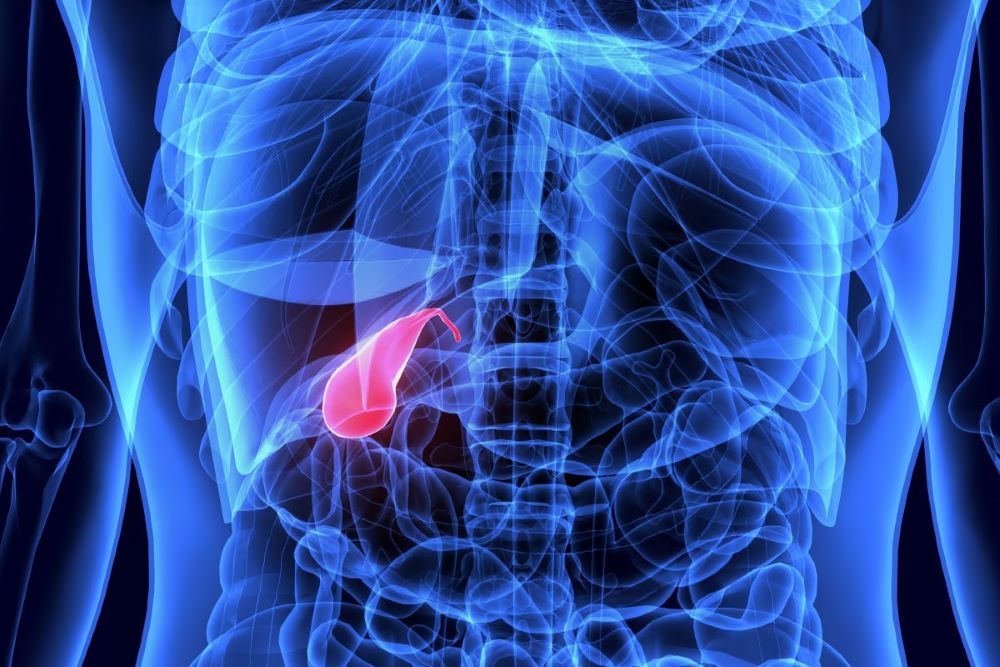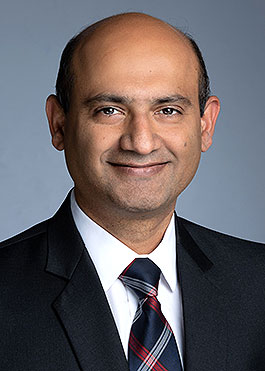
February marks Gallbladder Cancer Awareness Month.
The gallbladder is a pear-shaped organ situated in the abdomen beneath the liver. It plays a crucial role in storing and dispensing bile produced by the liver, aiding in food digestion.
Gallbladder cancer is relatively uncommon, with approximately 12,220 new cases and 3,800 deaths reported in the U.S. annually. A retrospective study showed that roughly 50% of gallbladder cancers are incidentally detected during cholecystectomy. Surgery remains the only potentially curative treatment.
Risk factors for gallbladder cancer include obesity, female gender, inflammation from chronic untreated gallstones, porcelain gallbladder (characterized by a hardened walls with calcium deposition), gallbladder polyps (>1 cm), chronic typhoid infection and primary sclerosing cholangitis.
Presentation and diagnosis
Patients with gallbladder cancer commonly present with pain in the upper right abdomen, exacerbated by food intake, along with abdominal bloating, loss of appetite, unintentional weight loss and jaundice. These symptoms often overlap with those of acute cholecystitis, gallbladder inflammation or gallstones.
Laboratory tests may show abnormal liver function, including elevated bilirubin, alkaline phosphatase and liver enzymes. Abdominal ultrasound, CT scan, or MRI can detect mass in the region of the gallbladder. When possible, patients with imaging findings concerning for cancer should be referred to hepatobiliary surgery prior to percutaneous or endoscopic biopsy as these come with a risk of seeding, and surgical resection may provide the diagnosis in addition to initial treatment. Once a diagnosis is made, typically through cholecystectomy or gallbladder removal, it is important to determine the stage. In addition to the series of imaging studies mentioned here, a staging laparoscopy may be required in some cases to determine the extent of the disease.
Treatment
Patients diagnosed with gallbladder cancer should receive care at a facility that has a multidisciplinary team comprising hepatobiliary surgeons, medical oncologists, radiation oncologists, radiologists, pathologists, nutritionists, palliative care specialists and others. The five-year survival rate for early-stage gallbladder cancer ranges from 60%-70% while for advanced disease it diminishes to 10%-25%.
Resectable disease: Surgery is the mainstay of treatment for early-stage disease if the lesion is localized and the surgery is deemed technically feasible.
For patients with T1a lesions which are confined to the first layer of the gallbladder wall, simple cholecystectomy may be sufficient. Patients with deeper tumors should be considered for definitive surgery that may include resection of the gallbladder, part of the adjacent liver, lymph nodes and bile duct (if involved). Prognostic factors that predict recurrence are lymph node involvement and positive margins.
In some advanced cases, such as jaundice at presentation or positive nodes on imaging, neoadjuvant (preoperative) chemotherapy is offered. If the disease progresses rapidly on chemotherapy, a futile surgery can be avoided.
Adjuvant (postoperative) chemotherapy with Capecitabine is offered to those with high-risk disease such as higher T stage, lymph node involvement or positive margins. Patients with positive margins are sometimes offered postoperative radiation or chemoradiation.
Unresectable disease: Gallbladder cancers are not amenable to surgery when there is extensive liver involvement, non-regional lymph node metastases or vascular encasement. In such cases, after a pathologic diagnosis is made, molecular testing is recommended.
Systemic therapies are similar in all biliary cancers. Recent clinical trials have established Gemcitabine-Cisplatin with either Durvalumab2 or Pembrolizumab3 as the first-line standard of care. Several recent studies also have established the safety and efficacy of targeted therapeutic options in biliary cancers in second and third-line settings.
Several recent studies established safety and efficacy of targeted therapy options in biliary cancers in the second- and third-line setting. The FDA-approved therapies ivosidenib for IDH1-mutated tumors, vemurafenib + trametinib for BRAF mutations, pemigatinib, infigratinib and futibatinib for FGFR aberrations, and pembrolizumab in MSI-H provide promising alternatives to chemotherapy with a better toxicity profile. Of note, gallbladder cancer has a high percentage of HER2 positivity. However, the efficacy of HER2-directed therapies is not yet established.
For tumors that do not harbor an actionable mutation, standard second/third-line therapies include 5FU with oxaliplatin or liposomal irinotecan.
Clinical trials, when available, remain the preferred treatment option for all stages and lines of therapy. For advanced-stage patients, nutrition and palliative care are also vital parts of comprehensive patient care.
References:
- Siegel, RL, KD Miller, and A Jemal. "Cancer Statistics, 2023." Cancer Journal, CA Cancer J Clin. 2023 Jan;73(1):17-48. doi: 10.3322/caac.21763.
- Oh, Do-Youn, Ji-Won Kim, and Hye Jin Kang, et al. "Durvalumab plus Gemcitabine and Cisplatin in Advanced Biliary Tract Cancer." NEJM Evid 2022;1(8). doi: 10.1056/EVIDoa2200015.
- Kelley, Robin Kate, Sameek Roychowdhury, and Amir A Rahmani, et al. "Pembrolizumab in Combination with Gemcitabine and Cisplatin Compared with Gemcitabine and Cisplatin Alone for Patients with Advanced Biliary Tract Cancer (KEYNOTE-966): A Randomised, Double-Blind, Placebo-Controlled, Phase 3 Trial." Lancet. 2023 Jun 3;401(10391):1853-1865. doi: 10.1016/S0140-6736(23)00727-4. Epub 2023 Apr 16.


